
A Lasting Legacy
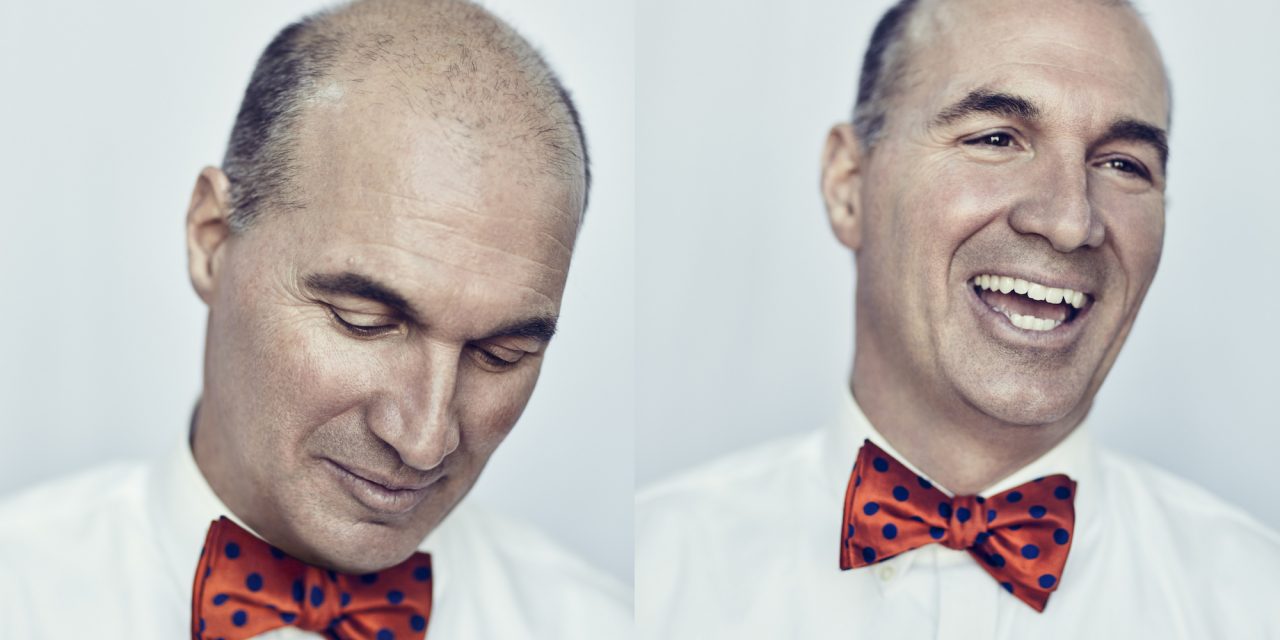
During both good times and challenging times in his 14-year tenure, Head of School Todd Bland brought the Milton community together.
Story by Marisa Donelan
Photographs by John Huet
One of the first tributes came during a night filled with laughter.
When “Dare to be Todd” flashed onstage before the final sketch of Wicked Sketchy, Milton’s irreverent annual comedy show, the packed audience might have expected some pointed jokes from the student per- formers at the expense of Head of School Todd B. Bland.
Instead, they got a wholesome, hilariously funny—and heartfelt—celebration of all things Bland: a parody of Lady Gaga’s “Bad Romance.” Bow tie–clad students sang and danced in honor of his 14 years at the helm of Milton Academy, a tenure characterized by an unrelenting focus on community and relationship building. For Bland, one particular lyric stood out: “Never worry alone.”
“That I would become synonymous with the phrase ‘Never worry alone’—well, nothing makes me prouder, even if it’s become a little bit of a joke,” he says. “There’s nothing more important to me than support, care, and love for others.”
Building connections and supportive relationships within the Milton community has been a central priority for Bland in his time as head of school, which will end in June. He arrived in 2009, a fractious time for Milton, which had weathered controversies both internal and external. A failed idea for restructuring Milton’s lower and middle grades had stoked anger among employees and families alike. Distrust was pervasive. Healing and care for the school’s people became a top priority.
“Never worry alone” became a watchword for the lifelong educator and school leader. To move forward, Milton people would need to lean on one another. Bland has repeated the phrase over the years in difficult times: the COVID-19 pandemic, an investigation into historical sexual misconduct at the school, and a reckoning with systemic racism at Milton and other predominantly white institutions. The best way to achieve progress, Bland reasons, is together.
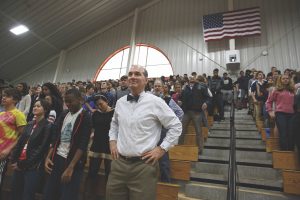
“Someone once described the role of a head of school in three component parts: pastoral, financial, and educational,” he says. “There’s a lot more, but most of the work can fit into those categories. I think I had strength in all of them to a degree, but a lot of strength on the pastoral side. I have always felt that it’s so important in this role. And Milton needed a lot of love.”
This focus on people and relationships allowed Bland to lead Milton through an important yet tumultuous period in the school’s history. One of the hallmarks of his time at Milton has been his ability to surround himself with a strong, talented, seasoned team—he is quick to point out that the successes of his tenure are shared achievements.
Over the course of his three decades as an independent school educator and leader, and during his youth, Bland was the beneficiary of care and personal investment from men- tors, teachers, coaches, and friends who believed in him. From the middle school teacher who first encouraged him to run for a student government position to the school leader who tapped him for his first administrative role, their belief in his abilities gave him confidence. The opportunity to pay it forward—to do the same for the young people in his classrooms—was what hooked him on teaching and has kept him in education.
In his relationships with Milton students, Bland has done his best to be visible and accessible, spending time teaching at each grade level every year, and opening his door to any students who had questions or concerns about the school.
“I love being part of a school community, and I love the impact that I can see,” he says. “Above all else, reflecting back on my whole career, the ability to influence the life of a child is the most extraordinary honor. People did that for me, and it changed my life. I knew that if I could do that for other young people, my life would be wonderful.”
In addition to leading Milton, Bland has loved his roles in other education-focused organizations: He has served on the board of the Steppingstone Foundation, chaired the board of the National Network of Schools in Partnership, and is a trustee of the Epiphany School in Boston.
Bland is the middle son of two Milton graduates—James Bland ’58 and Sherry Downes ’58. He and his two brothers spent their early years in Brunswick, Maine, where James Bland was an associate professor of history at Bowdoin College. Tragedy struck the young family when Todd was six and James died suddenly and unexpectedly. The Bowdoin community sprang into action, offering the family love and support even after they left Maine for Washington, D.C., to be closer to Sherry’s parents.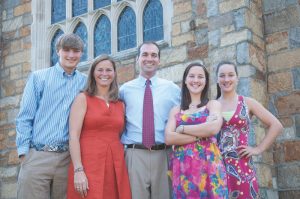
Bland attended St. George’s School in Rhode Island, where he was a prefect, a three-season athlete, and a lacrosse All-American. He describes himself as a hard-working student who excelled through middle school, then was hit with a “rude awakening” in his first year at St. George’s. He relates to students who are new to Milton’s academic rigor; during his tenure, Milton removed letter grades from the grade-nine transcript, a move de- signed to acclimate students to the school’s academic demands without discouraging them. Removing the letter grades helps them focus on improvement and growth.
When he became head of school, Bland also became a Milton parent. He and his wife, Nancy, have three children, all of whom graduated from Milton: Nick ’13, and twins Maggie ’14 and Emily ’14. The experience gave him a front-row seat to how students move through the school, academically and socially. “It was incredibly instructive and helped me be the leader that I be- came,” he says. “I was more sensitive to the student experience as a result of living it with them.”
The Blands’ children have left the nest, starting their careers and adult lives after graduating from college. Nick and his wife, Philly, have a son, James. “There has been no greater source of strength, support, and resilience for me than Nancy and our children,” says Todd Bland.
Bland is proud of Milton’s administrative team, which has worked diligently to improve the school’s financial health, continually renewed curriculum at all grade levels, completed the most successful fundraising campaign in Milton his- tory, and realigned its efforts for diversity, equity, and inclusion. The Dare campaign, which concluded in 2020, supported necessary capital improvements, faculty salary increases, and the implementation of a strategic plan. It raised $48 million for student financial aid, including the establishment of 44 new scholarship funds.
The campaign’s mission aligned with Bland’s leadership philosophy, placing top priority on investments in people.
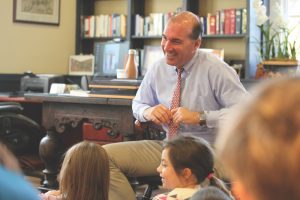 “I’m very proud of the campaign and grateful that it happened during my tenure,” he says. “It’s representative of a lot of good work from a lot of people. We were able to raise the school’s philanthropic profile and raise money for human capital. That the school’s endowment grew is wonderful, but I’m even more proud of how we directed those resources.”
“I’m very proud of the campaign and grateful that it happened during my tenure,” he says. “It’s representative of a lot of good work from a lot of people. We were able to raise the school’s philanthropic profile and raise money for human capital. That the school’s endowment grew is wonderful, but I’m even more proud of how we directed those resources.”
“I have always been inspired by the faculty and staff at Milton, particularly those who dedicate themselves so selflessly to our students,” he continues. “To serve them as head has been a great honor.”
Sound financial management by the Board and the school’s Business Office has allowed Milton to put money into its academic programs and professional development, something that’s reflected in the school’s use of space. The physical footprint of Milton Academy hasn’t changed much over the course of Bland’s tenure, other than the additions of the Pritzker Science Center and the Berylson Turf Field, but careful planning around how the school uses—and reuses— its resources has helped keep programs relevant to current students. New spaces in existing buildings have been dedicated, for example, to robotics and computer programming, visual arts, all-gender housing, and improved services for students’ physical and mental health. Future renovations will see Cox Library moving to Wigglesworth Hall and the Math Department moving into the library space.
“I have long believed that excellent institutions align their resources with their priorities,” Bland says. “And that seems simple, but many institutions don’t do that. They find themselves blowing a little bit more with the wind or a specific opportunity to raise money, as opposed to being very intentional about where they place their resources. We name our priorities first, and then we align our resources, and we’ve been very adamant that every endeavor we embarked on had to have a financially sustainable model before work began.”
Another source of pride for Bland is the way the school has responded to crises while prioritizing care for the people most affected. The COVID-19 pandemic proved to be costly and stressful for schools, but steady resource management and redirection of funds toward added health and safety measures, as well as technology for remote learning, helped keep Milton’s programs going. Following a Boston Globe report about sexual misconduct in private schools, Milton proactively hired an outside firm to investigate incidents at the school, uncovering abuse in the 1970s and ’80s by a former faculty member who in 2022 pleaded guilty to criminal charges. Working with alumni survivors, the school has dedicated resources to healing and regular training to prevent misconduct.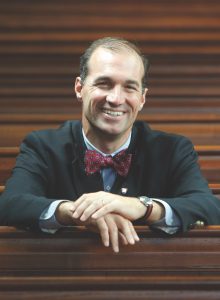
The school in 2020 established a committee to study issues of race, bias, and equity at Milton; the group made more than 50 recommendations to the Board of Trustees, who adopted them all. Implementation of the recommendations—including an expanded Department of Diversity, Equity, Inclusion, and Justice and programs for students at all levels, employees, alumni, and families—is ongoing.
In the summer, Bland will hand the reins to Alixe Callen ’88, Milton’s 13th head of school, and he takes seriously his responsibility for making it a smooth transition. He told the Board of Trustees about his plans to leave Milton nearly two years in advance so that they could engage in a thorough search for the next head. They found it in Callen, a Milton graduate who has led St. George’s since 2017.
Todd and Nancy Bland, who has worked at Milton in the Admissions Office and as a substitute teacher, plan to take some time to travel after they officially leave Milton. Neither is retiring; they are pausing to enjoy being grandparents and step off what Bland describes as “this very linear career trajectory we’ve had for 33 years.”
“We’ve had a great 14 years and we go with love and gratitude in our hearts. We’re just delighted to hand things over to a new leader.”




